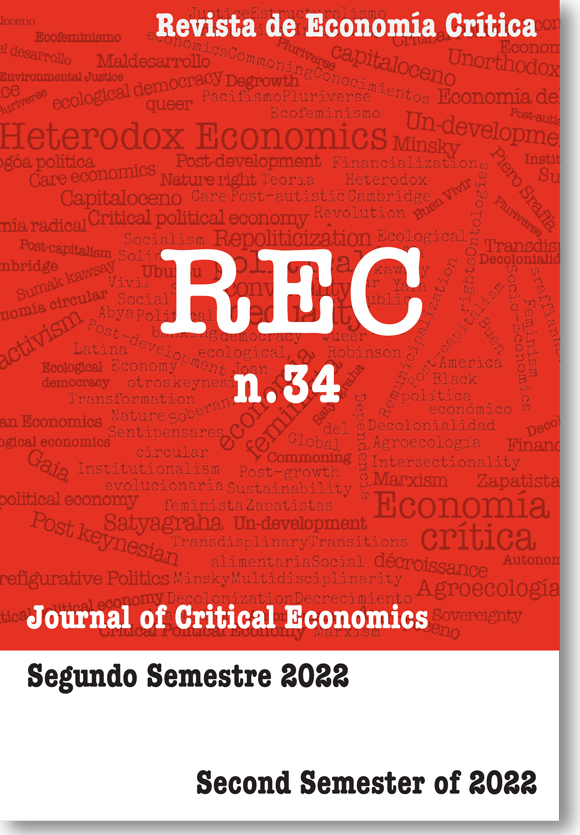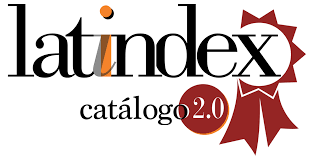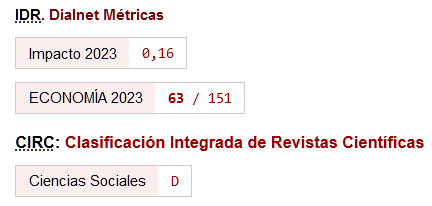Multi-scale integrated analysis of societal and ecosystem metabolism (MuSIASEM) revisited
synthesizing and updating the theoretical foundations
DOI:
https://doi.org/10.46661/rec.10513Keywords:
MuSIASEM, theoretical foundations, analytical tools, sociometabolic research, sustainabilityAbstract
Biophysical limits are becoming more evident now that the global economy has moved from an “empty world” to a “full world”. Acknowledging these limits requires a total reconfiguration of our current material and energy use pattern and a re-adjustment of existing social practices. Currently, dominant narratives refuse to acknowledge this fact. However, the failures in the fight to avoid irreversible damage to the biosphere are exposing the nature of the crisis: urgent action is needed, but adequate perspectives and analytical tools are lacking. This paper highlights the relevance of Multi-Scale Integrated Analysis of Societal and Ecosystem Metabolism (MuSIASEM), in its more mature version, to respond to these shortcomings by providing an analytical approach to sustainability based on complexity. To this end, the paper synthesizes the basic rationale of MuSIASEM, clarifying its interpretation of social-economic systems, the economic process and the sustainability predicament. The article also revisits and updates the robustness of its theoretical foundations, examining and discussing the concepts combined in the analytical framework. In addition, new analytical tools such as the metabolic processor, the externalized end-use matrix and the externalized environmental pressure matrix are introduced with reference to the latest case studies where they have been applied for an integrated and meaningful analysis of sustainability across dimensions, scales and levels. Finally, the paper concludes by noting that MuSIASEM is a methodology faithful to key principles of ecological economics.
Downloads
References
Ahmed, N., Marriott, A., Dabi, N., Lowthers, M., Lawson, M., & Mugehera, L. (2022). Inequality Kills: The unparalleled action needed to combat unprecedented inequality in the wake of COVID-19. https://doi.org/10.21201/2022.8465 DOI: https://doi.org/10.21201/2022.8465
Allen, T. F. H., & Giampietro, M. (2014). Holons, creaons, genons, environs, in hierarchy theory: Where we have gone. Ecological Modelling, 293, 31-41. https://doi.org/10.1016/j.ecolmodel.2014.06.017 DOI: https://doi.org/10.1016/j.ecolmodel.2014.06.017
Allen, T. F. H., & Starr, T. (1982). Hierarchy: Perspectives for Ecological Complexity. University of Chicago Press.
Barbieri, M. (2019). Code Biology, Peircean Biosemiotics, and Rosen's Relational Biology. Biological Theory, 14, 21-29. https://doi.org/10.1007/s13752-018-0312-z DOI: https://doi.org/10.1007/s13752-018-0312-z
Berkes, F., Colding, J., & Folke, C. (2003). Navigating Social-Ecological Systems: Building Resilience for Complexity and Change. Columbia University Press.
Cabello, V., Renner, A., & Giampietro, M. (2019). Relational analysis of the resource nexus in arid land crop production. Advances in Water Resources, 130(January), 258-269. https://doi.org/10.1016/j.advwatres.2019.06.014 DOI: https://doi.org/10.1016/j.advwatres.2019.06.014
Cadillo-Benalcazar, J. J., Giampietro, M., Bukkens, S. G. F., & Strand, R. (2020). Multi-scale integrated evaluation of the sustainability of large-scale use of alternative feeds in salmon aquaculture. Journal Of Cleaner Production, 248, 119211. https://doi.org/10.1016/j.jclepro.2019.119210 DOI: https://doi.org/10.1016/j.jclepro.2019.119210
Cadillo-Benalcazar, J. J., Renner, A., & Giampietro, M. (2020). A multiscale integrated analysis of the factors characterizing the sustainability of food systems in Europe. Journal of Environmental Management, 271, 110944. https://doi.org/10.1016/j.jenvman.2020.110944 DOI: https://doi.org/10.1016/j.jenvman.2020.110944
Cadillo-Benalcazar, J.J. & Renner, A. (2020). Top-down and bottom-up vegetal and animal product metabolic profiles for 29 European countries (EU27 + United Kingdom + Norway) [dataset] [www document]. Zenodo.
Capra, F. (1996). The Web of Life: A New Synthesis of Mind and Matter. HarperCollins.
Carpenter, J. (1988). They live. Universal Pictures.
Cilliers, P. (1998). Complexity and postmodernism: Understanding complex systems. Routledge.
Couix, Q. (2018). From Methodology to Practice (and Back): Georgescu-Roegen's Philosophy of Economics and the Flow-Fund Model. halshs-01854031 https://halshs.archives-ouvertes.fr/halshs-01854031
Couix, Q. (2019). Natural resources in the theory of production: the Georgescu-Roegen/Daly versus Solow/Stiglitz controversy. The European Journal of the History of Economic Thought, 26(6), 1341-1378. https://doi.org/10.1080/09672567.2019.1679210 DOI: https://doi.org/10.1080/09672567.2019.1679210
Daly, H. (2005). Economics in a full world. Scientific American, 293, 78-85. https://doi.org/10.1038/scientificamerican0905-100 DOI: https://doi.org/10.1038/scientificamerican0905-100
Di Felice, L. J. (2020). Energy systems as holarchies: Complexity and sustainability across scales [dataset] [www document]. Zenodo.
Di Felice, L. J., Cabello, V., Ripa, M. & Madrid-Lopez, C. (2021). Quantitative Storytelling: Science, Narratives, and Uncertainty in Nexus Innovations: Science, Technology & Human Values. https://doi.org/10.1177/01622439211053819 DOI: https://doi.org/10.1177/01622439211053819
Di Felice, L. J., Ripa, M. & Giampietro, M. (2019). An alternative to market-oriented energy models: Nexus patterns across hierarchical levels. Energy Policy, 431-443. https://doi.org/10.1016/j.enpol.2018.11.002 DOI: https://doi.org/10.1016/j.enpol.2018.11.002
Emmeche, C. & Kull, K. (eds.) (2011). Towards a Semiotic Biology: Life is the Action of Signs. Imperial College Press. https://doi.org/10.1142/p771 DOI: https://doi.org/10.1142/9781848166882
European Union Joint Research Center. (2010). International Reference Life Cycle Data System (ILCD) Handbook-General Guide for Life Cycle Assessment. European Union.
Fischer-Kowalski, M. (1998). Society's Metabolism: The Intellectual History of Material Flow Analysis, Part 1, 1860-1970. Journal of Industrial Ecology, 2(I), 61-78. https://doi.org/10.1162/jiec.1998.2.1.61 DOI: https://doi.org/10.1162/jiec.1998.2.1.61
Fischer-Kowalski, M. & Haberl, H. (eds.) (2007). Socioecological Transitions and Global Change: Trajectories of Social Metabolism and Land Use. Edward Elgar. https://doi.org/10.4337/9781847209436 DOI: https://doi.org/10.4337/9781847209436
Funtowicz, S. & Ravetz, J. (1993). Science for the post-normal age. Futures, 25(7), 735-755. https://doi.org/10.1016/0016-3287(93)90022-L DOI: https://doi.org/10.1016/0016-3287(93)90022-L
Gell-Mann, M. (1994). The Quark and the Jaguar. Freeman.
Georgescu-Roegen, N. (1971). The Entropy Law and the Economic Process. Harvard University Press. https://doi.org/10.4159/harvard.9780674281653 DOI: https://doi.org/10.4159/harvard.9780674281653
Gerber, J. F. & Scheidel, A. (2018). In Search of Substantive Economics: Comparing Today's Two Major Socio-metabolic Approaches to the Economy - MEFA and MuSIASEM. Ecological Economics, 144, 186-194. https://doi.org/10.1016/j.ecolecon.2017.08.012 DOI: https://doi.org/10.1016/j.ecolecon.2017.08.012
Giampietro, M. (1994). Using hierarchy theory to explore the concept of sustainable development. Futures, 26(6), 616-625.
https://doi.org/10.1016/0016-3287(94)90033-7 DOI: https://doi.org/10.1016/0016-3287(94)90033-7
Giampietro, M. (2003). Multi-Scale Integrated Analysis of Agro-ecosystems. CRC Press. https://doi.org/10.1201/9780203503607 DOI: https://doi.org/10.1201/9780203503607
Giampietro, M. (2018). Perception and representation of the resource nexus at the interface between society and the natural environment. Sustainability (Switzerland), 10(7), 2545. https://doi.org/10.3390/su10072545 DOI: https://doi.org/10.3390/su10072545
Giampietro, M. (2019a). On the Circular Bioeconomy and Decoupling: Implications for Sustainable Growth. Ecological Economics, 162, 143-156. https://doi.org/10.1016/j.ecolecon.2019.05.001 DOI: https://doi.org/10.1016/j.ecolecon.2019.05.001
Giampietro, M. (2019b). The quality of scientific advice for policy: a few insights from complexity. Report produced in the context of the Horizon2020 project MAGIC, Grant Agreement No. 689669, 07 May 2019.
Giampietro, M., Allen, T. F. H. & Mayumi, K. (2006). The epistemological predicament associated with purposive quantitative analysis. Ecological Complexity, 3, 307-327. https://doi.org/10.1016/j.ecocom.2007.02.005 DOI: https://doi.org/10.1016/j.ecocom.2007.02.005
Giampietro, M., Aspinall, R. J., Ramos-Martín, J. & Bukkens, S. G. F. (2014). Resource Accounting for Sustainability Assessment: The Nexus between Energy, Food, Water and Land use. Routledge. https://doi.org/10.4324/9781315866895 DOI: https://doi.org/10.4324/9781315866895
Giampietro, M., & Bukkens, S. G. F. (2015). Quality assurance of knowledge claims in governance for sustainability: Transcending the duality of passion vs. reason. International Journal of Sustainable Development, 18(4), 282-309. https://doi.org/10.1504/IJSD.2015.072662 DOI: https://doi.org/10.1504/IJSD.2015.072662
Giampietro, M. & Bukkens, S.G.F. (2022). Knowledge claims in European Union energy policies: Unknown knows and uncomfortable awareness. Energy Research & Social Science, 91(102739). https://doi.org/10.1016/j.erss.2022.102739 DOI: https://doi.org/10.1016/j.erss.2022.102739
Giampietro, M., Cadillo-Benalcazar, J. J., Di Felice, L. J., Manfroni, M., Pérez-Sánchez, L., Renner, A., Ripa, M., Velasco-Fernández, R. & Bukkens, S. G. F. (2020). Report on the Experience of Applications of the Nexus Structuring Space in Quantitative Storytelling. MAGIC (H2020-GA 689669) Project Deliverable 4.4, 30 August 2020.
Giampietro, M. & Funtowicz, S. (2020). From elite folk science to the policy legend of the circular economy. Environmental Science and Policy, 109, 64-72. https://doi.org/10.1016/j.envsci.2020.04.012 DOI: https://doi.org/10.1016/j.envsci.2020.04.012
Giampietro, M. & Mayumi, K. (2000a). Multiple-scale integrated assessment of societal metabolism: introducing the approach. Population and Environment, 22, 109-153. https://doi.org/10.1023/A:1026691623300 DOI: https://doi.org/10.1023/A:1026691623300
Giampietro, M. & Mayumi, K. (2000b). Multiple-scale integrated assessments of societal metabolism: Integrating biophysical and economic representations across scales. Population and Environment, 22, 155-210. https://doi.org/10.1023/A:1026643707370 DOI: https://doi.org/10.1023/A:1026643707370
Giampietro, M. & Mayumi, K. (2008). The Jevons Paradox: The Evolution of Complex Adaptive Systems and the Challenge for Scientific Analysis. In J. M. Polimeni, K. Mayumi, M. Giampietro & B. Alcott (Eds.), The Jevons Paradox and the Myth of Resource Efficiency Improvements (p. 200). Earthscan Research Edition.
Giampietro, M. & Mayumi, K. (2018). Unravelling the complexity of the Jevons Paradox: The link between innovation, efficiency, and sustainability. Frontiers in Energy Research, 6(APR), 1-13. https://doi.org/10.3389/fenrg.2018.00026 DOI: https://doi.org/10.3389/fenrg.2018.00026
Giampietro, M., Mayumi, K. & Sorman, A. H. (2012). The Metabolic Pattern of Societies : Where Economists Fall Short. Routledge.
https://doi.org/10.4324/9780203635926 DOI: https://doi.org/10.4324/9780203635926
Giampietro, M., Mayumi, K. & Sorman, A. H. (2013). Energy Analysis for a Sustainable Future: Multi-Scale Integrated Analysis of Societal and Ecosystem Metabolism. Routledge.
Giampietro, M. & Renner, A. (2020). The Generation of Meaning and preservation of Identity in Complex Adaptive Systems-The LIPHE4 Criteria. In Braha et al. (Ed.), Unifying Themes in Complex Systems X: Proceedings of the Tenth International Conference on Complex Systems. Springer (Series: Springer Proceedings in Complexity). https://doi.org/10.1007/978-3-030-67318-5_3 DOI: https://doi.org/10.1007/978-3-030-67318-5_3
González-López, R., & Giampietro, M. (2018). Relational analysis of the oil and gas sector of Mexico: Implications for Mexico's energy reform. Energy, 154, 403-414. https://doi.org/10.1016/j.energy.2018.04.134 DOI: https://doi.org/10.1016/j.energy.2018.04.134
González de Molina, M., Soto Fernández, D., Guzmán Casado, G. I., Infante Amate, J., Aguilera Fernández, E., Vila Traver, R. & García Ruiz, R. (2019). Historia de la agricultura española desde una perspectiva biofísica 1900-2010. Gobierno de España. Ministerio de Agricultura, Pesca y Alimentación.
González de Molina, M. & Toledo, V. M. (2014). The Social Metabolism. A Socio-Ecological Theory of Historical Change. Springer International Publishing. https://doi.org/10.1007/978-3-319-06358-4 DOI: https://doi.org/10.1007/978-3-319-06358-4
Haberl, H., Wiedenhofer, D., Pauliuk, S., Krausmann, F., Müller, D. B. & Fischer-Kowalski, M. (2019). Contributions of sociometabolic research to sustainability science. Nature Sustainability, 2(3), 173-184. https://doi.org/10.1038/s41893-019-0225-2 DOI: https://doi.org/10.1038/s41893-019-0225-2
Heinberg, R. (2007). Peak everything: walking up to the century of declines. New Society Publishers.
Holland, J. H. (1995). Hidden Order: How Adaptation Builds Complexity. Perseus Books.
Holland, J. H. (2006). Studying complex adaptive systems. J. Syst. Sci. Complex, 19, 1-8. https://doi.org/10.1007/s11424-006-0001-z DOI: https://doi.org/10.1007/s11424-006-0001-z
Holling, C. S. (2001). Understanding the complexity of economic, ecological, and social systems. Ecosystems, 4, 390-405.
https://doi.org/10.1007/s10021-001-0101-5 DOI: https://doi.org/10.1007/s10021-001-0101-5
Infante Amate, J., González de Molina, M. & Toledo, V. M. (2017). El metabolismo social. Historia, métodos y principales aportaciones. Revista Iberoamericana de Economía Ecológica, 27, 130-152.
Jasanoff, S. & Kim, S. H. (2015). Dreamscapes of Modernity: Sociotechnical Imaginaries and the Fabrication of Power. University of Chicago Press. https://doi.org/10.7208/chicago/9780226276663.001.0001 DOI: https://doi.org/10.7208/chicago/9780226276663.001.0001
Koestler, A. (1967). The Ghost in the Machine. Macmillan Co.
Kull, K., Deacon, T., Emmeche, C., Hoffmeyer, J. & Stjernfelt, F. (2009). Theses on biosemiotics: Prolegomena to a theoretical biology. Biological Theory, 4, 167-173. https://doi.org/10.1162/biot.2009.4.2.167 DOI: https://doi.org/10.1162/biot.2009.4.2.167
Lakoff, G. (2010). Why it matters how we frame the environment. Environmental Communication: A Journal Of Nature and Culture., 4(1), 70-81. https://doi.org/10.1080/17524030903529749 DOI: https://doi.org/10.1080/17524030903529749
Lotka, A. J. (1922). Contribution to the energetics of evolution. Proceedings of the National Academy of Sciences, 8(6), 147-151.
https://doi.org/10.1073/pnas.8.6.147 DOI: https://doi.org/10.1073/pnas.8.6.147
Louie, H. A. (2017). Intangible Life: Functional Connections In Relational Biology. Springer International.
Luhmann, N. (1995). Social Systems. Stanford University Press.
Manfroni, M., Bukkens, S. G. F., & Giampietro, M. (2021). The declining performance of the oil sector: Implications for global climate change mitigation. Applied Energy, 298, 117210. https://doi.org/10.1016/j.apenergy.2021.117210 DOI: https://doi.org/10.1016/j.apenergy.2021.117210
Manfroni, M., Velasco-Fernández, R., Pérez-Sánchez, L., Bukkens, S. G. F. & Giampietro, M. (2021). The profile of time allocation in the metabolic pattern of society: An internal biophysical limit to economic growth. Ecological Economics, 190, 107183.
https://doi.org/10.1016/j.ecolecon.2021.107183 DOI: https://doi.org/10.1016/j.ecolecon.2021.107183
Marcos-Valls, A., Kovacic, Z., Giampietro, M., Kallis, G. & Rieradevall, J. (2020). Isolated yet open: A metabolic analysis of Menorca. Science of the Total Environment, 738, 139221. https://doi.org/10.1016/j.scitotenv.2020.139221 DOI: https://doi.org/10.1016/j.scitotenv.2020.139221
Marmot, M. G. (2004). Evidence based policy or policy based evidence? BMJ, 329, 906-907. https://doi.org/10.1136/bmj.328.7445.906 DOI: https://doi.org/10.1136/bmj.328.7445.906
Martinez-Alier, J., Munda, G. & O'Neill, J. (1998). Weak comparability of values as a foundation for Ecological Economics. Ecological Economics, 26(3), 277-286. https://doi.org/10.1016/S0921-8009(97)00120-1 DOI: https://doi.org/10.1016/S0921-8009(97)00120-1
McKinnon, A. (2010). Energy and society: Herbert Spencer's "energetic sociology" of social evolution and beyond. Journal of Classical Sociology, 10(4), 439-455. https://doi.org/10.1177/1468795X10385184 DOI: https://doi.org/10.1177/1468795X10385184
Melgar-Melgar, R. E. & Hall, C. A. S. (2020). Why ecological economics needs to return to its roots: The biophysical foundation of socio-economic systems. Ecological Economics, 169, 106567. https://doi.org/10.1016/j.ecolecon.2019.106567 DOI: https://doi.org/10.1016/j.ecolecon.2019.106567
Munda, G. (2008). Social Multi-Criteria Evaluation for a Sustainable Economy. Springer. https://doi.org/10.1007/978-3-540-73703-2 DOI: https://doi.org/10.1007/978-3-540-73703-2
Nicolis, G. & Prigogine, I. (1977). Self-Organization in Nonequilibrium Systems. Wiley.
Odum, H. T. (1971). Environment, Power and Society. Wiley-Interscience.
Parra, R., Bukkens, S. G. F., & Giampietro, M. (2020). Exploration of the environmental implications of ageing conventional oil reserves with relational analysis. Science of the Total Environment, 749, 142371. https://doi.org/10.1016/j.scitotenv.2020.142371 DOI: https://doi.org/10.1016/j.scitotenv.2020.142371
Pattee, H. H. (1995). Evolving self-reference: Matter, symbols and semantic closure. Communication and Cognition-Artificial Intelligence, 12((1-2)), 9-27.
Pérez-Sánchez, L., Giampietro, M., Velasco-Fernández, R. & Ripa, M. (2019). Characterizing the metabolic pattern of urban systems using MuSIASEM: The case of Barcelona. Energy Policy, 124, 13-22. https://doi.org/10.1016/j.enpol.2018.09.028 DOI: https://doi.org/10.1016/j.enpol.2018.09.028
Pérez-Sánchez, L., Velasco-Fernández, R. & Giampietro, M. (2021). The international division of labor and embodied working time in trade for the US, the EU and China. Ecological Economics, 180, 106909. https://doi.org/10.1016/j.ecolecon.2020.106909 DOI: https://doi.org/10.1016/j.ecolecon.2020.106909
Pirgmaier, E. & Steinberger, J. K. (2019). Roots, riots and radical change-a road less travelled for ecological economics. Sustainability, 11(7). https://doi.org/10.3390/su11072001 DOI: https://doi.org/10.3390/su11072001
Prigogine, I. (1961). Introduction to thermodynamics of irreversible processes. Interscience Publishers.
Prigogine, I. & Glansdorff, P. (1971). Thermodynamic Theory of Structure, Stability and Fluctuation. Wiley.
Rashevsky, N. (1935). Mathematical Biophysics. Nature, 135, 528-530. https://doi.org/10.1038/135528a0 DOI: https://doi.org/10.1038/135528a0
Rayner, S. (2012). Uncomfortable knowledge: the social construction of ignorance in science and environmental policy discourses. Economy and Society, 41(1), 107-125. https://doi.org/10.1080/03085147.2011.637335 DOI: https://doi.org/10.1080/03085147.2011.637335
Renner, A., Cadillo-Benalcazar, J. J., Benini, L. & Giampietro, M. (2020). Environmental pressure of the European agricultural system: Anticipating the biophysical consequences of internalization. Ecosystem Services, 46, 101195. https://doi.org/10.1016/j.ecoser.2020.101195 DOI: https://doi.org/10.1016/j.ecoser.2020.101195
Renner, A., Louie, H. A. & Giampietro, M. (2020). Cyborgization of Modern Social-Economic Systems: Accounting for Changes in Metabolic Identity. In Braha et al. (Ed.), Unifying Themes in Complex Systems X: Proceedings of the Tenth International Conference on Complex Systems. Springer (Series: Springer Proceedings in Complexity). https://doi.org/10.1007/978-3-030-67318-5_9 DOI: https://doi.org/10.1007/978-3-030-67318-5_9
Ripa, M., Di Felice, L. J. & Giampietro, M. (2021). The energy metabolism of post-industrial economies. A framework to account for externalization across scales. Energy, 214, 118943. https://doi.org/10.1016/j.energy.2020.118943 DOI: https://doi.org/10.1016/j.energy.2020.118943
Rittel, H. W. & Webber, M. M. (1973). Dilemmas in a general theory of planning. Policy Sciences, 4, 155-169. https://doi.org/10.1007/BF01405730 DOI: https://doi.org/10.1007/BF01405730
Rockström, J., Steffen, W., Noone, K., Persson, A., Chapin, F. S., Lambin, E., Lenton, T. M., Scheffer, M. & Folke, C. (2009). Planetary Boundaries: Exploring the Safe Operating Space for Humanity. Ecology and Society, 14(2). https://doi.org/10.5751/ES-03180-140232 DOI: https://doi.org/10.5751/ES-03180-140232
Rosen, R. (2000). Essays on Life Itself. Columbia University Press.
Rosen, R. (2005). Life Itself: A Comprehensive Inquiry into the Nature, Origin, and Fabrication of Life. Columbia University Press.
Schrödinger, E. (1967). What is Life? Mind and Matter. Cambridge University Press.
Scott, I., & Gong, T. (2021). Coordinating government silos: challenges and opportunities. Global Public Policy and Governance, 1(1), 20-38. https://doi.org/10.1007/s43508-021-00004-z DOI: https://doi.org/10.1007/s43508-021-00004-z
Shove, E., Pantzar, M. & Watson, M. (2012). The dynamics of social practice : everyday life and how it changes. SAGE. https://doi.org/10.4135/9781446250655 DOI: https://doi.org/10.4135/9781446250655
Simon, H. A. (1962). The Architecture of Complexity: Hierarchic Systems. Proceedings of the American Philosophy Society, 106(6), 467-482.
Spash, C. L. (2015). The content, direction and philosophy of ecological economics. In Martinez-Alier, J. & Muradian, R. (Eds.), Handbook of Ecological Economics (pp. 26-47). Edward Elgar. https://doi.org/10.4337/9781783471416.00006 DOI: https://doi.org/10.4337/9781783471416.00006
Spash, C. L. (2020). A tale of three paradigms: Realising the revolutionary potential of ecological economics. Ecological Economics, 169, 106518. https://doi.org/10.1016/j.ecolecon.2019.106518 DOI: https://doi.org/10.1016/j.ecolecon.2019.106518
Spash, C. L. & Smith, T. (2019). Of ecosystems and economies: re-connecting economies with reality. Real-World Economics Review, 19(87), 221-229.
Strassheim, H. & Kettunen, P. (2014). When does evidence-based policy turn into policy-based evidence? Configurations, contexts and mechanisms. Evidence & Policy: A Journal of Research, Debate and Practice, 10(2), 259-277. https://doi.org/10.1332/174426514X13990433991320 DOI: https://doi.org/10.1332/174426514X13990433991320
Ulanowicz, R. E. (1986). Growth and Development: Ecosystem Phenomenology. Springer-Verlag. https://doi.org/10.1007/978-1-4612-4916-0 DOI: https://doi.org/10.1007/978-1-4612-4916-0
Velasco-Fernández, R., Dunlop, T. & Giampietro, M. (2020). Fallacies of energy efficiency indicators: Recognizing the complexity of the metabolic pattern of the economy. Energy Policy, 137. https://doi.org/10.1016/j.enpol.2019.111089 DOI: https://doi.org/10.1016/j.enpol.2019.111089
Velasco-Fernández, R., Pérez-Sánchez, L., Chen, L. & Giampietro, M. (2020). A becoming China and the assisted maturity of the EU: Assessing the factors determining their energy metabolic patterns. Energy Strategy Reviews, 32, 100562. https://doi.org/10.1016/j.esr.2020.100562 DOI: https://doi.org/10.1016/j.esr.2020.100562
Weitz, N., Carlsen, H., Nilsson, M. & Skånberg, K. (2018). Towards systemic and contextual priority setting for implementing the 2030 agenda. Sustainability Science, 13(2), 531-548. https://doi.org/10.1007/s11625-017-0470-0 DOI: https://doi.org/10.1007/s11625-017-0470-0
White, L. A. (1943). Energy and evolution of culture. American Anthropologist, 14, 335-356. https://doi.org/10.1525/aa.1943.45.3.02a00010 DOI: https://doi.org/10.1525/aa.1943.45.3.02a00010
Wiedmann, T., Lenzen, M., Keyßer, L. T. & Steinberger, J. K. (2020). Scientists' warning on affluence. Nature Communications, 3107.
https://doi.org/10.1038/s41467-020-16941-y DOI: https://doi.org/10.1038/s41467-020-16941-y
Zipf, G. K. (1941). National Unity and Disunity: The Nation as a Biosocial Organism. Principia Press.
Downloads
Published
How to Cite
Issue
Section
License
Copyright (c) 2022 Juan Jesús Larrabeiti-Rodríguez, Raúl Velasco-Fernández

This work is licensed under a Creative Commons Attribution 4.0 International License.
This licence allows third parties to share (copy and redistribute the material in any medium or format) and adapt (remix, transform and create from the material for any purpose, including commercial purposes), provided that authorship and first publication in this journal (The Journal, DOI of the work) is acknowledged, a link to the licence is provided, and it is stated whether changes have been made to the work.







